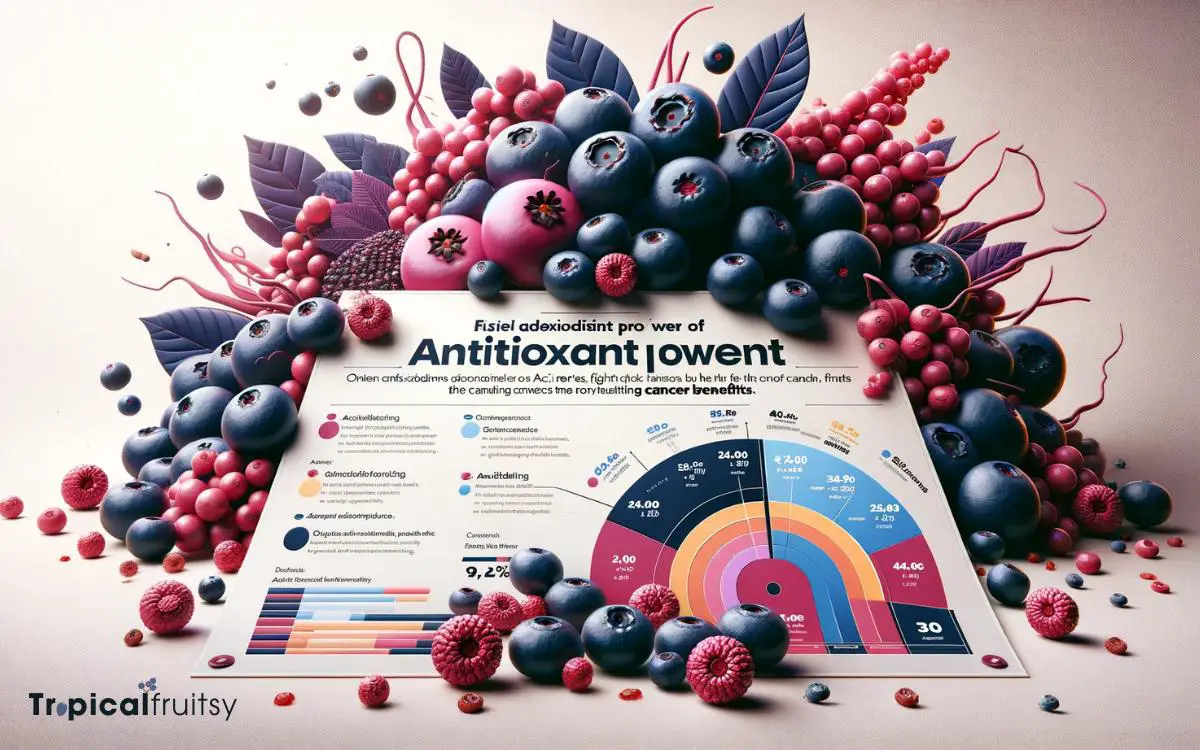Acai Berry Benefits for Cancer: A Guide!
Acai berries from the Amazon rainforest are rich in antioxidants, particularly anthocyanins and flavonoids, which may help protect against oxidative stress and cancer.
Preclinical studies suggest they could inhibit cancer cell growth, boost immune response, and have anti-inflammatory properties. Exploring their nutritional benefits for cancer care is promising.

Key Takeaway
Understanding Acai Berries

Originating from the Amazon rainforest, the acai berry is a small, deep purple fruit harvested from the acai palm tree, known scientifically as Euterpe oleracea.
Esteemed for its nutritional profile, acai berries are rich in antioxidants, particularly anthocyanins, which confer their vibrant color and may mitigate oxidative stress.
Clinical investigations suggest that these compounds have a potential role in cancer prevention due to their ability to neutralize free radicals, known contributors to carcinogenesis.
Furthermore, acai berries contain essential fatty acids, fiber, and various phytochemicals, all of which are recognized for supporting overall health.
While research is ongoing, current evidence points towards the acai berry’s capacity to support a robust antioxidant defense system, which is pivotal in maintaining cellular integrity and reducing cancer risk.
Antioxidant Powerhouse

The acai berry’s high concentration of anthocyanins and other antioxidants is instrumental in its potential to combat oxidative stress, a key factor in the development of cancer.
Research indicates that these potent compounds can neutralize free radicals, which if left unchecked, may lead to cellular damage and the initiation of carcinogenic processes.
The antioxidant capacity of acai berries is often quantified using the Oxygen Radical Absorbance Capacity (ORAC) score, with acai ranking among the highest of all fruits and vegetables tested.
This suggests a significant protective potential, although clinical studies are required to establish a direct causative link between acai berry consumption and cancer prevention.
Nevertheless, incorporating acai into a balanced diet may contribute to an overall antioxidant defense system, supporting cellular health and reducing the risk of cancer development.
Acai and Cancer Cells
The relationship between acai berry consumption and cancer cell dynamics has garnered interest in the scientific community due to the fruit’s high antioxidant activity.
Studies have suggested that compounds found in acai berries may inhibit tumor growth and induce apoptosis in malignant cells.

It is imperative to examine these findings through rigorous clinical trials to establish the potential therapeutic benefits of acai berries in oncology.
Antioxidant Activity
Investigating the antioxidant activity of acai berries reveals potential mechanisms for their anticancer effects, as these fruits are rich in compounds known to neutralize free radicals and reduce oxidative stress in cells.
The relevance of antioxidants in the context of cancer prevention and therapy has been underscored by numerous studies, which point to the importance of dietary sources like acai berries.
The specific antioxidant actions of acai include:
1. Inhibition of free radical formation, thereby protecting cellular DNA from damage.
2. Enhancement of cellular antioxidant defense systems.
3. Modulation of tumor cell apoptosis (programmed cell death) through redox balance.
4. Reduction of inflammation, which is a known contributor to cancer progression.
These points highlight the potential of acai berries as part of a diet aiming to support cancer prevention and complement existing treatments, although further clinical research is necessary to fully understand their role.
Tumor Growth Inhibition
Acai berries’ impact on cancer cells includes the potential to inhibit tumor growth, a promising area of research that delves into the mechanisms by which these berries may exert anticancer properties.
Studies have shown that the bioactive compounds in acai berries, particularly anthocyanins and polyphenols, can disrupt the proliferation of malignant cells.
These phytochemicals may induce apoptosis, also known as programmed cell death, which is a critical process in preventing the spread of cancerous cells.
Additionally, acai’s anti-inflammatory effects may also play a role in impeding tumor growth, as chronic inflammation is a known contributor to cancer development.
While the evidence is mounting, clinical trials are necessary to substantiate acai berries’ efficacy as a complementary approach in cancer treatment.
Acai Berry Benefits: Potential Cancer Prevention Properties
| Benefit | Description | Research Findings |
|---|---|---|
| Antioxidant Properties | Acai berries are high in antioxidants which help in neutralizing free radicals in the body. | Laboratory studies suggest that acai could have cancer-fighting properties due to the antioxidants it contains. |
| Anti-inflammatory Effects | The anti-inflammatory properties of acai berries may reduce the risk of cancer by preventing inflammation. | Animal studies have shown that acai pulp reduces inflammation, which could theoretically lower cancer risk. |
| Immune System Boost | Acai berries contain vitamin C and ellagic acid, which might boost the immune system. | Research indicates that a strengthened immune system can help in fighting off cancer cells. |
| Potential Anti-Cancerous Compounds | Some compounds in acai berries, like polyphenols, have been studied for their anti-cancerous potential. | Test-tube studies have found that polyphenols from acai can induce the death of leukemia cells. |
| Inhibition of Cancer Cell Proliferation | Acai berries might inhibit the growth and reproduction of cancer cells. | Several laboratory studies have suggested that acai extract could inhibit the proliferation of colon cancer cells. |
Immune System Support

Regarding immune system support, acai berries are rich in phytochemicals that may bolster the body’s natural defense mechanisms against cancerous cells.
The constituents of acai berries have been studied for their impact on the immune system with promising indications.
Here are several ways these phytochemicals may confer benefits:
- Antioxidant Activity: Acai berries contain high levels of antioxidants, which can neutralize free radicals and reduce oxidative stress—a factor in immune system aging and dysfunction.
- Anti-inflammatory Properties: Chronic inflammation can suppress immune function; acai’s anti-inflammatory compounds may help in modulating the immune response.
- Enhancing Cellular Health: Nutrients in acai may aid in maintaining the integrity of immune cells, ensuring effective operation.
- Stimulating Immune Cells: Certain studies suggest that acai berry extracts can stimulate the proliferation of immune cells, potentially increasing the body’s ability to fight infections and cancer cells.
Anti-inflammatory Properties
Emerging research indicates that acai berries may possess significant anti-inflammatory properties, which are vital in the context of cancer therapy.
Studies have shown that compounds in acai can reduce inflammation markers, which are often linked to cancer progression and chronic disease.
Furthermore, acai’s bioactive constituents have been found to inhibit the production of pro-inflammatory cytokines, thereby potentially interfering with inflammatory pathways involved in cancer development.

Reduces Inflammation Markers
Within the realm of oncology, acai berry’s anti-inflammatory properties have shown promise in reducing markers of inflammation, which are often elevated in cancer patients.
The consumption of acai berries may offer the following benefits:
- Decrease in C-Reactive Protein (CRP): Studies suggest that acai berry intake can lead to a reduction in CRP levels, a key indicator of inflammation.
- Lowering of Cytokines: Acai consumption may suppress the production of pro-inflammatory cytokines, potentially mitigating cancer-associated inflammation.
- Modulation of Enzyme Activity: Enzymes like COX-2 that promote inflammation are often targeted by acai’s bioactive compounds, reducing their activity.
- Inhibition of Inflammatory Pathways: Key signaling pathways involved in inflammation, such as NF-kB, may be inhibited by nutrients found in the acai berry.
These actions, rooted in the fruit’s rich phytochemical content, could be advantageous in a cancer care context.
Chronic Disease Connection
Addressing chronic diseases, acai berries’ anti-inflammatory properties may play a role in mitigating the progression of conditions often associated with cancer.
Chronic inflammation is a recognized contributor to the development of various malignancies and other non-communicable diseases.
Acai berries contain anthocyanins and flavonoids, which are potent antioxidants that help reduce inflammatory responses.
Research suggests that these bioactive compounds can interrupt inflammatory pathways, thereby potentially reducing the risk of chronic disease progression.
Clinically, incorporating acai berries into a balanced diet may offer supportive therapy for individuals managing chronic conditions, although it should not replace conventional treatments.
Health professionals advocate for further investigation to conclusively determine the extent of acai berries’ impact on chronic diseases in the context of cancer prevention and adjunctive care.
Inhibits Inflammatory Cytokines
While acai berries are renowned for their high antioxidant content, their ability to inhibit pro-inflammatory cytokines further underscores their potential anti-cancer properties.
These deep-purple fruits may contribute to a reduction in the inflammatory processes associated with cancer progression.
Here’s how:
- Anthocyanins: Acai berries are rich in anthocyanins, which can downregulate the production of inflammatory cytokines like TNF-alpha and IL-6.
- Modulation of NF-κB: The berry extract has been shown to inhibit the activation of NF-κB, a protein complex that plays a key role in controlling the expression of inflammatory genes.
- Cyclooxygenase Enzymes: Acai compounds may suppress the activity of cyclooxygenase enzymes (COX-1 and COX-2), reducing the synthesis of pro-inflammatory eicosanoids.
- Immune Cell Regulation: Acai berry components may alter the function of various immune cells, potentially leading to a decrease in inflammation-driven cancer cell proliferation.
Understanding these properties can guide informed dietary choices in individuals seeking to mitigate inflammation-related cancer risks.
Nutritional Profile Breakdown

Commonly regarded for its dense nutritional composition, the acai berry is rich in vitamins, minerals, and antioxidants that are essential for maintaining cellular health and potentially mitigating cancer progression.
Acai berries contain high levels of vitamin C and vitamin A, both known for their immune-enhancing properties.
The mineral content includes potassium, which is crucial for heart health, and small amounts of calcium and magnesium, important for bone density.
The most notable feature of acai’s nutritional profile is its extraordinary concentration of anthocyanins, a type of flavonoid with potent antioxidant effects.
These compounds have been studied for their ability to reduce oxidative stress and modulate the expression of genes linked to cancer pathogenesis.
Moreover, acai berries provide dietary fiber, which supports digestive health and may help in the regulation of glucose levels, a factor relevant to cancer risk reduction.
Research and Clinical Studies
Several studies have investigated the impact of acai berries on cancer cells, revealing promising results in terms of growth inhibition and apoptosis induction.
The phytochemicals present in acai, particularly anthocyanins, have attracted research interest for their potential anti-cancer properties.

Here are key findings from clinical studies:
- Cell Lines: Research on various cancer cell lines, including leukemia and colon cancer, showed that acai extract could reduce proliferation and induce cell death.
- Animal Models: Studies on rodents have demonstrated that acai supplementation can decrease tumor growth.
- Antioxidant Mechanisms: Acai berries’ high antioxidant capacity may protect cells from oxidative stress, potentially reducing cancer risk.
- Human Trials: Limited but growing clinical trials in humans suggest a positive impact, though more research is needed to confirm therapeutic benefits.
These studies highlight the need for further clinical trials to establish clear guidelines for acai berry consumption in cancer prevention and treatment.
How Do Acai Berry Benefits for the Liver Compare to Its Benefits for Cancer?
When comparing acai berry benefits for liver and cancer, it’s evident that while acai berry may support liver health, its effects on cancer are inconclusive. Studies have shown that acai berry can promote liver function and protect against liver damage, but its impact on cancer prevention or treatment remains uncertain.
Incorporating Acai Into Diet

Although research on acai berries has indicated potential cancer-fighting properties, incorporating them into one’s diet should be approached with consideration of nutritional balance and scientific guidance.
Acai berries are rich in antioxidants, fiber, and heart-healthy fats. However, they should complement a diet that includes a variety of fruits and vegetables to ensure a broad spectrum of nutrients.
To integrate acai into your diet, consider adding pure acai berry pulp to smoothies, bowls, or yogurts.
This method preserves the berry’s nutrients without added sugars that are often found in commercial acai products.
For those with dietary restrictions or taking medication, it’s advisable to consult a healthcare provider before making significant dietary changes, as acai berries can interact with certain medications and underlying health conditions.
Conclusion
Acai berries emerge as a beacon of hope in the realm of oncology, with their rich tapestry of antioxidants, immune-modulating, and anti-inflammatory constituents.
While the fruit’s full potential against cancer remains veiled in scientific infancy, its nutritional profile offers a promising adjunct to traditional interventions.
Continued research may unveil the acai berry’s complete role in this intricate dance with cellular destiny, potentially choreographing a new rhythm in cancer prevention and support.






